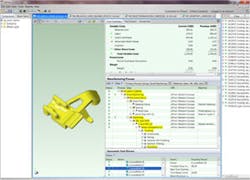Product Cost Management Platform for High-Tolerance Machining
Also, responding to the market need for better methods to estimate the cost of hard tooling (e.g., capital investments to support part production) that can be used by tooling experts, as well as non-experts, aPriori said it has significantly upgraded the program’s abilities to generate highly detailed tooling cost estimates for components.
The platform is supported on Solidworks 2011, Inventor 2011, and Solid Edge ST3 CAD systems, as well as Oracle 11g database.
The developer calls its Product Cost Management software a “flexible and powerful costing engine” that can determine the cost of a part or product from a CAD model, “instantly and precisely,” based on the manufacturing process, materials to be used, and the manufacturing site or region. Designers, cost engineers, sourcing professionals, and suppliers use aPriori to get accurate cost assessments in real-time cost assessments that help companies attack cost at the point of origin. As design changes are made, or new product specs are introduced, the program will automatically re-assesses and update the product cost estimate. It said this “new level” of cost knowledge will let companies make more informed decisions about design and production, reducing product costs throughout the product lifecycle.
“Premium product manufacturers whose customers have historically not been overly price sensitive are now increasing their priority on controlling costs,” stated Julie Driscoll, v.p. of marketing strategy & product management for aPriori. “For example, companies involved in manufacturing oil-and-gas equipment are finding that new government safety regulations are driving significant product cost increases. Their customers have demonstrated that they are not willing to shoulder all of these additional costs through price increases. This trend is forcing companies to analyze opportunities to control costs in the design and sourcing of components.
“In response to this market need,” Driscoll continued, “aPriori 2011r2 includes significantly enhanced high-tolerance machining capabilities that will allow these companies to quickly and easily calculate cost throughout the entire design, sourcing and manufacturing process, and understand the financial implications of each and every tradeoff decision they make.”
Manufacturers and shops performing high-tolerance machining from stock will find aPriori 2011r2 introduces new costing capabilities. In particular, the developer cited users in automotive, oil-and-gas equipment, semi-conductor equipment, aerospace, and defense will benefit from aPriori’s ability to automate with accuracy the costing of parts with precision machining requirements. New baseline cost models in aPriori 2011r2 include Mill/Turn, 5-Axis Milling, Deep Bore/Trepanning, Deburring, and Inspections.
In addition, the release has new modules with expanded costing processes for several specific production process, such as the Powder Metal module, which estimates material mixing, forming and sintering which can optionally be followed by heat treatments, machining and surface treatments. The Packaging module adds cost models for Carton Forming, Pack-and-Load, and Carton Sealing, including support for semi-automated packaging. The Rapid Prototyping Module lets manufacturers estimate costs at the prototype stage, saving the expense of tooling, for processes like SLA, SLS and 3D Printing.
The Tandem Die module (part of the Sheet Metal II process group for high-volume die requirements) estimates costs for stamped parts made via automated transfer of parts between multiple presses.
Several new modules are targeted at injection molding operations. The Blow Molding module provides the ability to calculate costs for plastic products, while the Roto Molding module offers geometry recognition functions and adds support for containers with non-round openings (e.g., ovals, rectangles, etc.) This provides more detailed and accurate costing for fact-based negotiation with suppliers. Lastly, the new Injection Molding module incorporates improved models for baseline cost and revamped tooling. Users benefit from accelerated cycle time calculation and more accurate estimates, access to more detailed tooling estimates for plastic components.
aPriori said it has extended its out-of-the-box costing capabilities to generate detailed tooling estimates that include data about the physical attributes of the tool (e.g., mold size, actions, lifters etc.), materials and purchased items (e.g., core & cavity plates, ejector box etc.), and labor and machine times (design, machining, assembly, tryout etc.). Each time a component cost is determined, a tooling cost is automatically generated, providing non-tooling experts quick access to precise estimates. This promises to speed up quote generation, so manufacturers can respond to more RFQs, and increase revenue.
The developer said aPriori 2011r2 allows users to access new, pre-configured views for parts and rollups, to save time and achieve greater self-sufficiency. For example, users can view a summary, process detail report, or should-cost analysis for any part. Default roll-up views include outlier analysis, should-cost analysis and process detail reports. Users also can create and save their own table views. Other additions include user-defined defaults for production information settings, saving time when initializing parts specific to a project.
About the Author
Robert Brooks
Content Director
Robert Brooks has been a business-to-business reporter, writer, editor, and columnist for more than 20 years, specializing in the primary metal and basic manufacturing industries.
